 Tax authorities could be
pushing the boundaries of legality as they seek to increase the
revenue they collect, say lawyers – meanwhile, the risk of
being held liable for facilitating tax evasion could mean some law
firms consider scrapping their tax practices
Tax authorities could be
pushing the boundaries of legality as they seek to increase the
revenue they collect, say lawyers – meanwhile, the risk of
being held liable for facilitating tax evasion could mean some law
firms consider scrapping their tax practices
Given that the Spanish and Portuguese governments are looking to
raise more money for the public purse, the respective nations'
tax authorities are being set even higher targets in terms of the
amount of cash they need to collect. Consequently, lawyers claim,
corporate taxpayers are being increasingly squeezed by the taxman,
to the extent that, in the view of some, they may even be going
beyond what is legally permitted. As a result, tax demands are
increasingly being disputed with the result that litigation is on
the rise. While this means more instructions related to contentious
matters, there are other forces at work that mean there is also
considerable cause for concern among tax lawyers. There is a fear
that the tax advice provided by law firms to their clients could
potentially be viewed, in some quarters, as facilitating tax
evasion. If the relevant authorities were to take a dim view of
such practices, there is the chance that law firms could be held
liable, with the result that they could suffer severe financial and
reputational damage. In this context, some lawyers suggest that law
firms could cease investing in their tax departments because of the
potential liabilities or even go as far as to scrap them
altogether.

More aggressive
The Spanish tax authorities are adopting an increasingly aggressive
position, particularly in relation to their efforts to tax
businesses on profits obtained abroad, says Juan Alberto
Urrengoechea, partner at Roca Junyent. He adds that transfer
pricing issues and an increase in tax litigation are also
generating an increase in work for lawyers. Meanwhile, providing
tax-related advice on cross-border deals is becoming increasingly
challenging for lawyers, according to Latham & Watkins partner
Jordi Domínguez, as it is difficult to make an assessment on
the "practical implications of BEPS [base erosion and profit
sharing] and the extent of the changes that will derive from the
implementation of the multilateral instrument to modify bilateral
tax treaties". 
The fact that some countries are taking measures to attract
investment by reducing tax rates is creating opportunities for
lawyers, according to Javier Gónzalez Carcedo, partner at
PwC Tax and Legal Services, who adds that tax transparency –
in relation to the Organisation for Economic Co-operation and
Development's BEPS initiative - is also providing considerable
work for law firms. The fact that it is difficult to predict the
outcome of inspections carried out by the tax authorities is a
significant challenge for lawyers when advising clients, according
to Ashurst partner Eduardo Gracia. He adds that the authorities are
becoming more aggressive because the "goals they are set are
more difficult to achieve in terms of collections". Gracia
also says that there is considerably more tax litigation taking
place, to the extent that the courts are overcrowded.
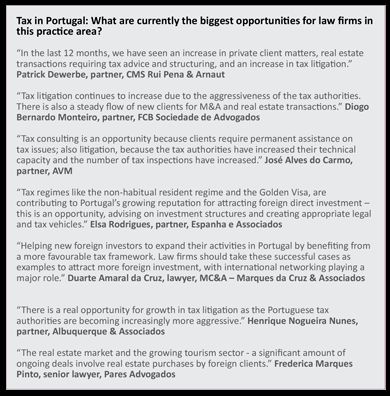 Andrés
Sánchez, partner at Cuatrecasas, Gonçalves Pereira,
says the outcome of recent cases means there is more certainty
about what to expect in terms of court rulings. "The courts
are becoming more pro-taxpayer, so there are some reasons for
hope," he adds. A key concern is "soft law" –
mainly derived from the BEPs recommendations – and its
application by the tax authorities and courts, according to
Víctor Viana, partner at Uría Menéndez.
"There is no clear picture in the current tax environment and
this shapes our relationship with the authorities and
clients," he says. "The changing, and more restrictive,
rules and criteria may result in growing tension regarding the
lawyer's role and relationship vis-à-vis clients and tax
authorities."
Andrés
Sánchez, partner at Cuatrecasas, Gonçalves Pereira,
says the outcome of recent cases means there is more certainty
about what to expect in terms of court rulings. "The courts
are becoming more pro-taxpayer, so there are some reasons for
hope," he adds. A key concern is "soft law" –
mainly derived from the BEPs recommendations – and its
application by the tax authorities and courts, according to
Víctor Viana, partner at Uría Menéndez.
"There is no clear picture in the current tax environment and
this shapes our relationship with the authorities and
clients," he says. "The changing, and more restrictive,
rules and criteria may result in growing tension regarding the
lawyer's role and relationship vis-à-vis clients and tax
authorities."
Many transactions involving companies need to be reported to the
board so in-house lawyers are "no longer willing to accept
vague advice", says Francisco Martín Barrios, partner
at Deloitte Abogados. "Multinationals are now reacting to
BEPS, there was more activity in this area in 2016 and it will
increase in 2017," he adds. Silvia Paternain, partner at
Freshfields, says there are reservations about the implementation
of BEPS. She adds: "It will be difficult to read between the
lines, the European Union is keen on multilateral tax treaties, but
who else is really committed?" Meanwhile, Paternain says there
are also doubts about the application of tax law. "The tax
authorities are aggressive, but are they properly applying the law?
Are they going beyond the law?"
Linklaters partner Javier García-Pita says that regardless
of how well a tax lawyer is prepared from a technical perspective
when dealing with the tax authorities, the authorities have strict
targets they have to meet in terms of collections. "The
authorities are increasingly pressured to comply with their cash
objectives and sometimes it seems they are more keen on getting to
the figure than they are on the technical support of the
assessment," he says. García-Pita adds that, due to the
uncertainty around tax, one strategy is for clients to ask the tax
authorities for an opinion on a proposed tax structure. However,
Domínguez says that timing can be an issue when seeking to
obtain a ruling from the tax authorities on M&A deals. He adds:
"Despite the excellent team within the General Directorate of
Taxation, on some occasions the timing of the transactions makes it
very difficult to seek an opinion."
'Robin Hood' mentality
Media coverage of tax issues is often negative, says Paternain,
highlighting "corporate tax issues being reported upon in a
way that implies those in question are guilty of tax avoidance or
paying little taxes, but without much further thought or
analysis". She adds: "This enables a ´Robin
Hood' attitude, but the press should take it seriously because
tax is law and there are many legal reasons why a company can pay
less taxes in Spain and not be publicly ashamed." Araoz &
Rueda partner Javier Prieto says a growing global trend is an
"increase in the level of managers' liability for
companies' tax matters". He adds that tax law is
constantly changing and this is a "big risk", but also a
great opportunity for law firms, though the challenge is to
"persuade clients of the added value provided and convert this
into good fees". Meanwhile, uncertainty regarding the
participation exemption regime is proving challenging for lawyers,
according to Clifford Chance counsel Roberto Grau. He adds that, as
some tax demands are retrospective, there have been situations
where clients have "asked for financing to pay the tax
authorities".
Clients are reluctant to sue the tax authorities, partly due to the
fact that it can take up to ten years before a case is resolved if
it goes to the higher courts, say some lawyers. 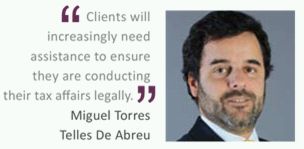 Meanwhile, Antonio Montero, counsel at CMS
Albiñana & Suárez de Lezo says: "In some
instances, especially in the most complex cases, it's very
difficult to give an opinion with certainty on what the decision of
the courts will be." He adds that, in the last 12 months,
political uncertainty in Spain "meant there has been no new
tax laws in development at a time when everybody (the tax
administration, taxpayers and tax lawyers) needs more precision in
relation to the tax rules".
Meanwhile, Antonio Montero, counsel at CMS
Albiñana & Suárez de Lezo says: "In some
instances, especially in the most complex cases, it's very
difficult to give an opinion with certainty on what the decision of
the courts will be." He adds that, in the last 12 months,
political uncertainty in Spain "meant there has been no new
tax laws in development at a time when everybody (the tax
administration, taxpayers and tax lawyers) needs more precision in
relation to the tax rules".
Generally speaking, tax is becoming a more important aspect of
every transaction, Gonzáles Carcedo says. "Because tax
is becoming more relevant and more complex, structures need to be
amended as there is a reputational risk," he adds.
Sánchez says one concern for law firms is that
companies' in-house legal departments are becoming larger and
therefore they are able to handle more tax-related legal matters
in-house.
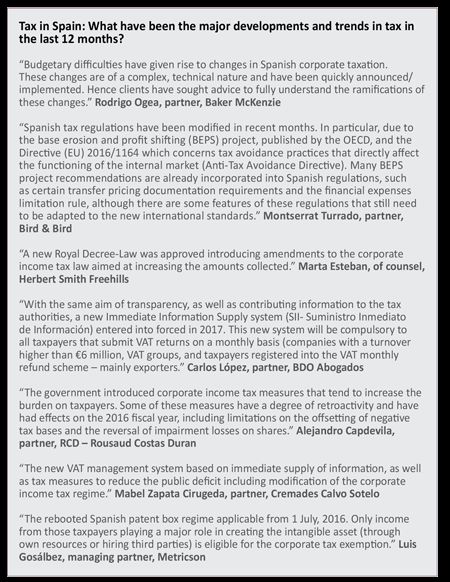 Flight to
quality
Flight to
quality
There are currently many good opportunities for tax lawyers, says
Viana. "One client trend is a ´flight to quality' in
times of higher risk, while there are more opportunities due to an
increase in litigation, and there is a lot of transfer-pricing and
compliance-related work." A leading tax partner comments that
some firms may start to ask themselves whether, as a law firm,
"they are more exposed by having a tax department, they may
wonder whether they would we be better off without a tax
group". Other lawyers say there is a possibility that, due to
the potential liabilities associated with providing tax-related
legal advice, law firms will limit future investment in their tax
departments.
One partner comments that the large auditing firms have an
advantage in some fields of tax law, but law firms are better
placed to handle more sophisticated tax work. Meanwhile, in
reference to the competition between the legal arms of the 'Big
Four' auditors and more traditional law firms, one tax lawyer
in the Madrid office of an international law firm says: "I
think the principle of legal privilege will become more relevant,
there is privacy – companies can speak to a lawyer knowing
that the information is confidential."
While increasing legal activity may mean a higher volume of fees,
this does not necessarily mean an increase in profitability, says
Urrengoechea. He adds: "There has been a change in the
provision of tax services, previously clients generally wanted tax
planning schemes, now they want advice on how to avoid future tax
problems. García-Pita says uncertainty creates opportunities
for law firms and adds that tax governance, tax controversy, APAs
[advance pricing agreements] and audits will mean a greater volume
of work for lawyers in the coming year. He adds: "Deal flow
will increase [in the coming year] and tax advice will be more
relevant in deals." García-Pita adds that fees could go
up: "I see restrictions on fees being removed."
Martín Barrios agrees that there is currently an opportunity
for law firms to increase fees and profitability. He says:
"There is a higher demand for senior tax lawyers as there is a
scarcity of them, it is therefore critical to bring talent into
firms." Viana adds that there will be many opportunities for
tax lawyers in relation to real estate, distressed assets, M&A
and private equity deals in the coming months. Meanwhile, Grau says
that an increase in transactions, including private equity deals,
will generate significant work for tax lawyers in the next 12
months.
 Portugal:
Maximising collections
Portugal:
Maximising collections
With regard to tax developments in Portugal, MLGTS partner
Francisco de Sousa da Câmara says that due to corporate and
personal income tax reforms, as well as the BEPS initiative, more
rules related to tax transparency and the exchange of information
have been introduced, with the effect that "greater tax
transparency, accountability and compliance" is now expected
from corporations and individuals. He adds that there has been an
increased level of vigilance on the part of the tax authorities as
they seek to tackle tax avoidance, and consequently, "on many
occasions tax assessments have been made to maximise collection,
which has led to significant levels of litigation".
The shift of the Portuguese government to the left of the political
spectrum brought a change in tax policy, PLMJ partner Nuno Cunha
Barnabé says. "The planned reduction of the corporate
tax rate to 17 per cent by 2019 was abandoned and the rate frozen
at 21 per cent, while some measures perceived as having a
regressive effect on personal taxation were revoked." He adds:
"A new tax on residential property (known as "AIMI")
was introduced on 1 January 2017. It appears that the new
government will pursue the objective to increase tax revenues
through indirect taxation and the property taxes, rather than by
continuing to increase income taxes."
The biggest tax-related opportunities for law firms relate to the
structuring of real estate investments and the re-domiciliation of
companies and businesses to Portugal, says Vieira de Almeida
partner Tiago Marreiros Moreira. He adds that with the
restructuring of the financial sector, clients' need for tax
compliance advice, as well as tax-related litigation and
arbitration, will also generate significant amounts of work. Marta
Pontes, partner at Uría Menéndez-Proença de
Carvalho, says the Portuguese tax authorities are now more
aggressive, and consequently, tax litigation and arbitration will
be an important area of opportunity. She adds: "Wealth
management is expected to be an important area of development,
especially considering the success of the Portuguese non-domiciled
resident regime and golden visa programme."
Planning problems
It is getting increasingly difficult for companies to plan their
tax affairs, according to Telles De Abreu Advogados managing
partner Miguel Torres. "This is a significant opportunity to
conduct new business since clients, corporate and private, will
increasingly need assistance to ensure that they are conducting
their tax affairs legally and as efficiently as possible," he
adds. "As compliance costs rise and the risks of conducting
business without obtaining proper tax advice become greater,
clients will increasingly feel the need to seek out high quality
tax consultancy services."
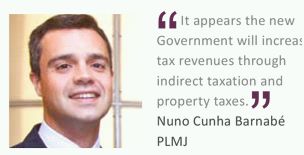 Tourism and real
estate-related matters are on the increase in Portugal and this is
generating more work for tax lawyers, says Cuatrecasas,
Gonçalves Pereira partner Diogo Ortigão Ramos.
"In parallel, financing transactions and the restructuring of
both portfolio and banking sector entities were also a market trend
in 2016," he adds. "The favourable, and highly-praised,
non-habitual tax resident regime continued to attract
high-net-worth individuals, and with them, a demand for estate
planning and inheritance and family law advice." Meanwhile,
António Moura Portugal, partner at ABBC, says contentious
matters provide a steady flow of work for tax lawyers in Portugal,
though he adds that the constantly evolving nature of tax law
provides a challenge given that clients are looking for
stability.
Tourism and real
estate-related matters are on the increase in Portugal and this is
generating more work for tax lawyers, says Cuatrecasas,
Gonçalves Pereira partner Diogo Ortigão Ramos.
"In parallel, financing transactions and the restructuring of
both portfolio and banking sector entities were also a market trend
in 2016," he adds. "The favourable, and highly-praised,
non-habitual tax resident regime continued to attract
high-net-worth individuals, and with them, a demand for estate
planning and inheritance and family law advice." Meanwhile,
António Moura Portugal, partner at ABBC, says contentious
matters provide a steady flow of work for tax lawyers in Portugal,
though he adds that the constantly evolving nature of tax law
provides a challenge given that clients are looking for
stability.
The digitalization of the economy means that lawyers need to
"speed up" their services to clients and provide a more
"pragmatic international overview" when responding to
enquiries, according to Tiago Caiado Guerreiro, partner at Caiado
Guerreiro. He adds that, due to Portugal's "stagnating
economy", fees for legal services are decreasing. pbbr of
counsel João Marques Pinto says competition from auditors is
one of the biggest challenges law firms currently face. According
to CCA Ontier partner Carla Matos, corporate income tax rate
– which stands at 21 per cent – has had an
"adverse impact" on corporate investment in Portugal. She
adds: "Our biggest challenge is to convince investors to move
to Portugal in spite of this."
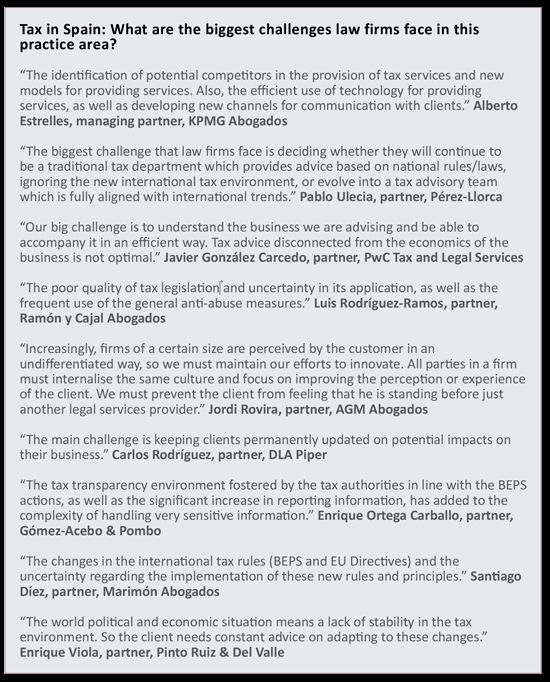
The content of this article is intended to provide a general guide to the subject matter. Specialist advice should be sought about your specific circumstances.

